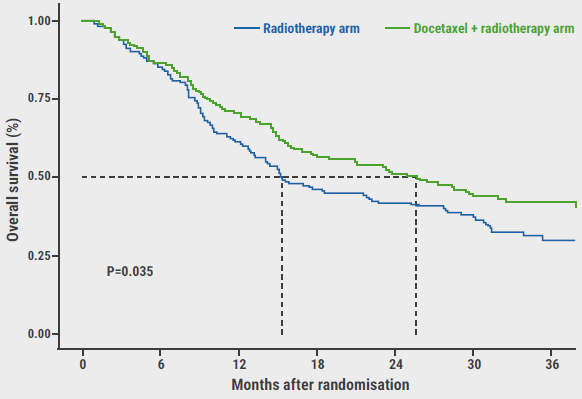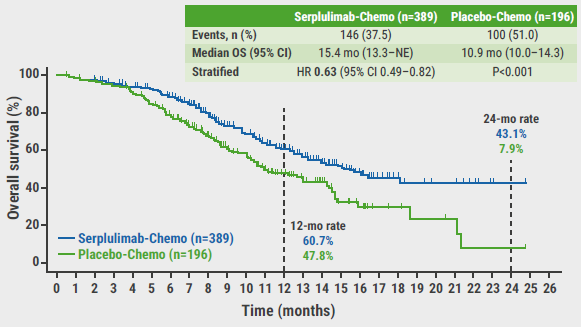https://doi.org/10.55788/ad85bd6a
The randomised, double-blind, phase 3 PALOMA-2 trial (NCT01740427) was designed to assess the benefits of adding the CDK4/6 inhibitor palbociclib to endocrine therapy. The primary analysis demonstrated that the median progression-free survival (PFS) of patients on palbociclib plus letrozole (n=444) was significantly longer than that of patients who received letrozole and placebo (n=222; 24.8 vs 14.5 months; HR 0.58; P<0.001) [1]. Prof. Richard Finn (David Geffen School of Medicine at UCLA, CA, USA) presented the final OS analysis after a median follow-up of 90 months [2].
The median OS was not significantly longer in the experimental arm compared with the placebo arm (53.9 vs 51.2 months; HR 0.96; P=0.34). Prof. Finn emphasised that missing survival data was substantial and disproportionally divided across the treatment arms, with 21% missing data in the placebo arm and 13% missing data in the palbociclib arm, limiting the interpretation of OS data. A post-hoc sensitivity analysis, excluding patients of whom survival data was not available, resulted in a median OS of 51.6 months in the palbociclib arm and 44.6 months in the placebo arm (HR 0.87). Additionally, when the authors looked at the subgroup of patients with a disease-free interval >12 months from PALOMA-1 (NCT00721409) and PALOMA-2, the OS data favoured patients on palbociclib over placebo (64.0 vs 44.6 months). Furthermore, in PALOMA-2 the time to chemotherapy appeared to be longer in the experimental arm (38.1 vs 29.8 months), indicating an improved quality-of-life for patients on palbociclib. Finally, the safety profile of the combination therapy remained consistent with long-term use, with no signs of cumulative toxicity.
Prof. Claudine Isaacs (Georgetown University, DC, USA), discussant of this trial, commented that there are several explanations for the lack of OS results of this trial in comparison with the MONALEESA trials (NCT01958021, NCT02422615, NCT02278120), which showed the CDK4/6 inhibitor ribociclib to boost OS [3]. “There could be an intrinsic difference in the efficacy of the 2 CDK4/6 inhibitors. Also, the PALOMA-2 trial included more patients with a disease-free interval ≤12 months, which may reflect greater resistance to endocrine therapy in these patients. This may influence the results. We should therefore await the results of the HARMONIA trial (NCT05207709), comparing ribociclib with palbociclib directly,” argued Prof. Isaacs.
- Finn RS, et al. Overall Survival (OS) With First-Line Palbociclib Plus Letrozole (PAL+LET) Versus Placebo Plus Letrozole (PBO+LET) in Women With Estrogen Receptor-Positive/Human Epidermal Growth Factor Receptor 2-Negative Advanced Breast Cancer (ER+/HER2- ABC): Analyses From PALOMA-2. LBA1003, ASCO 2022 Annual Meeting, 3–7 June, Chicago, IL, USA.
- Finn RS, et al. N Engl J Med. 2016;375:1925–1936.
- Hortobagyi G, et al. Ann Oncol. 2021;32(suppl5):S1283–S1346.
Copyright ©2022 Medicom Medical Publishers
Posted on
Previous Article
« Practice-changing results of T-DXd in HER2-low breast cancer Next Article
Sacituzumab govitecan meets primary endpoint »
« Practice-changing results of T-DXd in HER2-low breast cancer Next Article
Sacituzumab govitecan meets primary endpoint »
Related Articles

August 5, 2022
Novel treatment option for KRAS wildtype pancreatic cancer

© 2024 Medicom Medical Publishers. All rights reserved. Terms and Conditions | Privacy Policy
HEAD OFFICE
Laarderhoogtweg 25
1101 EB Amsterdam
The Netherlands
T: +31 85 4012 560
E: publishers@medicom-publishers.com

